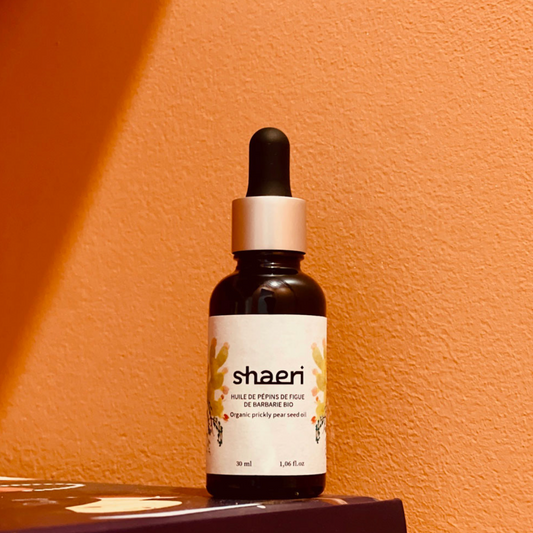Argan oil, a natural ingredient with multiple virtues
Argan oil is a very nourishing vegetable oil, used for centuries by Berber women. At Shaeri, we use argan oil for some of our products for its nourishing and regenerating properties.

-
Argan oil
Argan oil or "Moroccan Oil" comes from the kernel of the fruit of the argan tree, an endemic tree that grows mainly in the Souss plain (in southwestern Morocco).
The manufacture of argan oil is an artisanal activity, traditionally reserved for Berber women in independent cooperatives. They delicately extract the almonds contained in the kernel of the fruit of the tree. These "kernels" are crushed and made into a paste. This paste is then mixed and kneaded with lukewarm water to obtain an oil: argan oil.
-
The Many Benefits of Argan Oil
This oil has many qualities including many cosmetic properties. Argan oil contains several components with many benefits: essential fatty acids (omega 6 and 9), vitamin E (tocopherols), vitamin A and antioxidants.
Argan oil is known for its nourishing and regenerating properties. It provides deep hydration. Iargan oil is the ideal treatment to rehydrate and strengthen the hair against external aggressions (heat from a hair dryer or curling iron, UV rays, dry cold and wind, salt water from the sea or chlorinated water..). It can indeed be used as a preventive measure, before swimming for example.
In addition to good hydration, hair also needs nutrition. Produced by the scalp, it is sebum that protects the hair fiber. If it is not produced in sufficient quantity and the hair lacks nutrition, it becomes dry, dull and rough. The lengths become brittle and the ends split. Argan oil deeply nourishes and regenerates the hair, from tip to root. It acts at the heart of the hair fiber. Applied regularly, it keeps hair soft and silky, shiny and easy to comb.
Argan oil also helps to better structure the curls of the hair. At Shaeri, we use argan oil in our care cream. Argan oil helps to soften and redraw the curls of wavy, curly or frizzy hair which, naturally, regulates its hydration less well and reacts more easily to humidity (with the appearance of "frizz").




